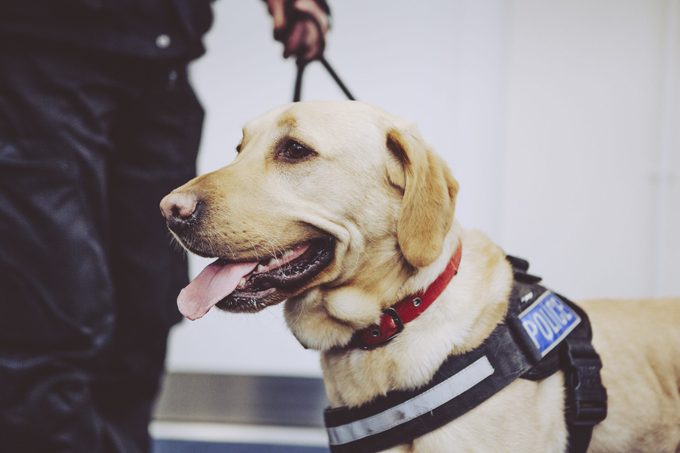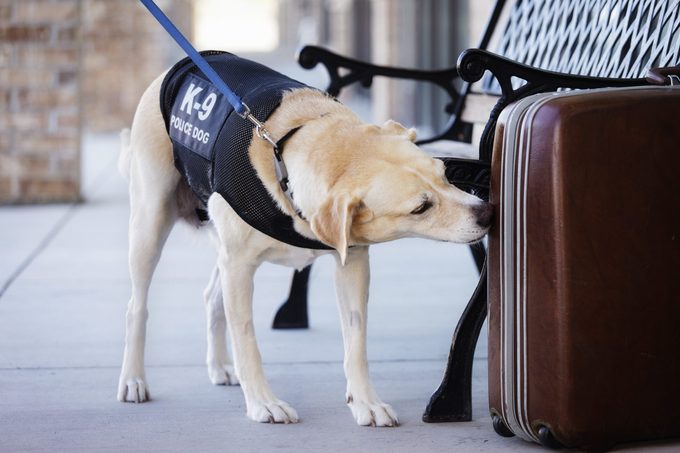Police dogs work tirelessly to keep their handlers and communities safe. But what happens to K9 dogs when they retire?

This Is What Happens to K9 Dogs When They Retire

All dogs are incredible companions, and that is especially true of K9 dogs. These fearlessly brave dogs receive special training that allows them to assist law enforcement in ways no human or other animal can. They use their keen sense of smell to sweep buildings for explosives and narcotics, they apprehend dangerous suspects on the run, and they even assist in rescuing people lost in the wilderness or missing after natural disasters. But what happens to K9 dogs when they retire? Keep reading, because we talked to Sara Ochoa, DVM, a small-animal and exotic veterinarian in West Monroe, Louisiana, to answer that question.
Get Reader’s Digest’s Read Up newsletter for more pets, humor, cleaning, travel, tech and fun facts all week long.
Why do police dogs retire?
People retire as they get older, and that’s also true for police dogs. Police dogs work extremely hard their whole lives, assisting their trusted police companions. By the time they are between the ages of 7 and 11, they’re usually ready to retire, according to The Spruce Pets.
This is often due to natural aging, declining energy levels and the physical toll of years on the job. Retirement allows them to enjoy a slower pace of life, often living out their days with their handler or being adopted into a loving home. (In some cases, K9 dogs may also experience some post-traumatic stress disorder, so on a case-by-case basis, they might be retired for that reason.)
What happens to retired police dogs?

These days, K9 dogs are adopted into loving homes after they retire. However, this was not always the case. Many retired police dogs were euthanized before President Bill Clinton ended the practice in 2000 by signing Robby’s Law, which states that retired police and military dogs can be adopted by their handlers or other service members.
“Most K9 police dogs will go live with a family. Most of the time, this is the same person who was their handler but could be anyone the police force approves to have the dog,” says Dr. Ochoa.
The handlers of police dogs are generally the first choice to adopt the animals, according to The Spruce Pets. It’s a perfect pairing, as the handler and police dog already have an established bond, which ensures a happy dog.
What if the handler cannot adopt the dog?
But what if a K9’s handler is unable to adopt the dog? That’s when other people come into play. According to The Spruce Pets, a K9 dog can be adopted by the general public in cases where the handler has passed away or doesn’t have the capacity to care for the dog.
For those worried about police dogs adjusting to normal, civilian life, Dr. Ochoa puts those concerns to rest. She says, “These dogs usually adjust very easily to home life. They are kept with a family during their working time and once it is over can easily adjust to living with kids and a family.”
About the expert
|
Why trust us
At Reader’s Digest, we’re committed to producing high-quality content by writers with expertise and experience in their field in consultation with relevant, qualified experts. We rely on reputable primary sources, including government and professional organizations and academic institutions as well as our writers’ personal experiences where appropriate. We verify all facts and data, back them with credible sourcing and revisit them over time to ensure they remain accurate and up to date. Read more about our team, our contributors and our editorial policies.
Sources:
- The Spruce Pets: “How to Adopt Retired Police Dogs: A Guide to Giving Heroes a Second Chance”
- Tracking Congress & the White House: “Promotion of Adoption of Military Working Dogs”
- Sara Ochoa, DVM, small-animal and exotic veterinarian and assistant veterinarian at the Animal Hospital of West Monroe in Monroe, Louisiana

















